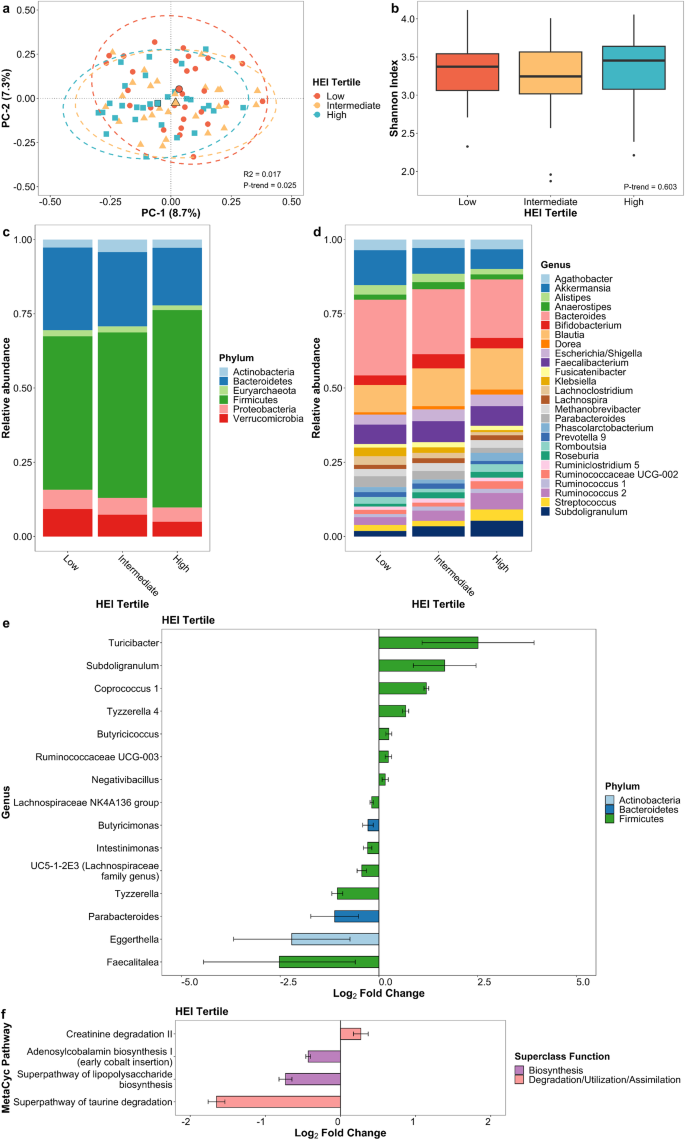Parkinson’s disease (PD) has been linked to alterations in the gut microbiota, possibly mediated through the gut-brain axis. This study aimed to investigate the associations between diet quality, fiber intake, added sugar intake, and gut microbiome composition, as well as predicted metagenomic pathways, in PD patients.
Methods:
- Participants: Fecal samples were collected from 85 PD patients in central California.
- Diet Assessment: Diet quality was assessed using the Healthy Eating Index 2015 (HEI-2015) based on the Diet History Questionnaire II.
- Microbiome Analysis: Fecal samples were subjected to 16S rRNA gene sequencing to assess gut microbiota composition.
- Statistical Analysis: Associations between diet variables and gut microbiota were examined, adjusting for confounders such as age, sex, race/ethnicity, and sequencing platform.
Key Scientific Findings:
Effect of Diet Quality:
- Higher HEI-2015 scores were associated with an increase in putative anti-inflammatory butyrate-producing bacteria, including 𝘉𝘶𝘵𝘺𝘳𝘪𝘤𝘪𝘤𝘰𝘤𝘤𝘶𝘴 𝘢𝘯𝘥 𝘊𝘰𝘱𝘳𝘰𝘤𝘰𝘤𝘤𝘶𝘴 1.
- Predictive metagenomic analysis suggested a reduction in lipopolysaccharide biosynthesis and taurine degradation pathways with higher HEI scores, indicating potential reduction in neuroinflammation.
Impact of Fiber Intake:
- Higher fiber intake was associated with an increase in SCFA-producing bacteria, such as 𝘉𝘶𝘵𝘺𝘳𝘪𝘤𝘪𝘤𝘰𝘤𝘤𝘶𝘴, 𝘊𝘰𝘱𝘳𝘰𝘤𝘰𝘤𝘤𝘶𝘴 1, 𝘢𝘯𝘥 𝘙𝘰𝘮𝘣𝘰𝘶𝘵𝘴𝘪𝘢, known for their anti-inflammatory properties and benefits for intestinal integrity.
- Conversely, added sugar intake was associated with a decrease in these beneficial bacteria, potentially exacerbating systemic inflammation and disease progression in PD.
Association with Predicted Functional Pathways:
- A healthier diet was linked to reduced lipopolysaccharide biosynthesis and taurine degradation pathways, suggesting mitigation of systemic inflammation and potential neuroprotective effects.
- Higher added sugar intake was associated with an increase in amyloid-producing bacteria, 𝘒𝘭𝘦𝘣𝘴𝘪𝘦𝘭𝘭𝘢, which may contribute to cerebral inflammation and alpha-synuclein accumulation.
Dietary Intervention in Early vs. Advanced PD:
- Early dietary interventions may have a more pronounced effect on modulating SCFA-producing bacteria, highlighting the importance of dietary management in early PD stages.
- However, in advanced PD, changes in the gut microbiome may be less responsive to dietary interventions, suggesting the need for early intervention strategies.
This study demonstrates associations between diet quality, fiber intake, added sugar intake, and gut microbiome composition and predicted functional pathways in PD patients. A healthier diet was associated with an increase in beneficial SCFA-producing bacteria and reduction in pro-inflammatory taxa, potentially mitigating neuroinflammation and disease progression in PD. These findings underscore the importance of dietary management in PD and highlight the potential benefits of dietary interventions in modulating the gut microbiome and improving patient outcomes.
Link to the article : https://tinyurl.com/mvu6sa64
